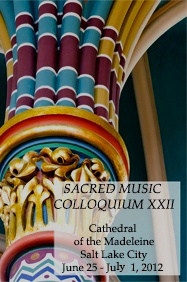From http://musicasacra.com/forum/comments.php?DiscussionID=4544&page=1#Item_3
* darrharis
* CommentTime2 days ago
Hello, I'm a non-musician and new here, so forgive my naivety and ignorance.
Would it be fair to say that most of the liturgical music that church choirs choose and sing (and aside from chant) is biased to what they personally like singing i.e. a reflection of their own tastes in music? If so, where does this priority sit in most people's minds in relation to more objective liturgical priorities such as providing music that will enrich the prayers of the congregation? There may be overlap between the two priorities of course, but
not necessarily, esp if the congregation are not enthused (or even distracted) by what is being sung.
#
* CommentAuthorchonak
* CommentTime2 days ago
Welcome to the forum, darrharis!
One weakness in most parishes' music can be summed up in the phrase: "Don't sing at the Mass, sing the Mass." In a lot of parishes, people sing four hymns (entrance, offertory, communion, recessional), but don't sing the ordinary parts of the Mass.
The Church actually sets objective priorities for us in her teaching about sacred music. The priest and the congregation should be singing their dialogues ("The Lord be with you"/"And also with you") and the major parts of the Mass ordinary (Kyrie, Gloria, Credo, Sanctus, Agnus Dei). The Mass is sort of designed to work well that way, and the Church's teaching about liturgical music urges us to sing those parts first of all. That's the kind of "active participation" Vatican II wanted, in which people are directly involved in their role as the congregation at the Mass.
Instead, many parish musicians have their choirs or congregations sing hymns, anthems, or songs. They may be good music or even great music (or maybe not-so-great music) perhaps, but they're not an official part of the Mass text, so they really are just being tacked onto the Mass at the parish. They're incidental to the Mass, and they're not really the prayer of the Church. It's lawful to use them (generally), but it's a poor second or third-choice, considering how wonderful it is for a congregation to sing the Mass itself.
When a congregation and priest do sing their respective parts of the Mass, the role of the choir makes sense: it's to sing the variable elements in the Mass -- the entrance antiphon, the psalm between the readings, the offertory antiphon, and the communion antiphon -- which require practice because the texts and melodies change from week to week.
I hope this is sort of along the lines you're thinking about.
Anyway, welcome: to find out more about what the CMAA is and does, watch the great video about our annual summer colloquium, produced by artist collaborative Corpus Christi Watershed.
Subscribe to:
Post Comments (Atom)

No comments:
Post a Comment